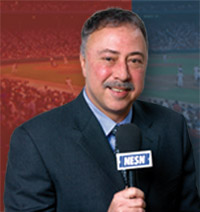RemDawg
Favorite Citizen of Red Sox Nation
By Lewis I. Rice
Jerry Remy is RemDawg, the former Red Sox second baseman who, for the last 18 years, has been the Red Sox color analyst. Remy is the commentator who “colors” the Red Sox  broadcasts, adding to the play-by-play with background facts and figures, and interesting commentary on why things happen on the field as they do. He has transcended the usual prominence of the job to achieve a celebrity that provides profitable offshoots, including the popular web site, remyreport.com, endorsement deals, an eatery, and a best-selling book. The longtime Weston resident has developed a cult following at the same time the Red Sox have attained their long-denied success.
broadcasts, adding to the play-by-play with background facts and figures, and interesting commentary on why things happen on the field as they do. He has transcended the usual prominence of the job to achieve a celebrity that provides profitable offshoots, including the popular web site, remyreport.com, endorsement deals, an eatery, and a best-selling book. The longtime Weston resident has developed a cult following at the same time the Red Sox have attained their long-denied success.
“If the Red Sox were a team struggling like a Toronto or a Tampa, that cult would not have happened,” says Craig Mustard, a Wellesley High School English teacher who co-hosts a weekend talk show on sports radio WEEI. “Because of the total fanaticism and intensity in Red Sox Nation, quite a number of people know who Jerry Remy is, and primarily his work is spectacular. People respect him as a great analyst and they also like him as a personality. He’s analytic, entertaining, and he’s accessible to the audience.”
Mustard, who has interviewed Remy several times on WEEI, says, “He’s certainly an easy guy to talk to.” And more and more these days, people want to talk to him. Yet Remy shies away from the spotlight, protecting his privacy and preserving a simple lifestyle. His idea of a wild night is ordering a cocktail in his hotel room after an away game. He could be speaking at banquet halls and appearing at functions five nights a week, he says, but he’d rather stay at home.
“I’ve always been a loner,” he says. “It’s nothing personal; it’s the way I conduct my life. People think I’m crazy because here I am on television talking to millions of people, but yet I don’t go make speeches. I’m not comfortable doing that. People ask how that can be. I don’t know. That’s the way I am. I’m very comfortable on air, but I’m not comfortable off.”
Remy may feel at home on air now, but he didn’t start out that way. Initially he wasn’t comfortable analyzing the action on the field. He never expected to serve in that role, just as he never really expected to play professional baseball. After retiring in 1986, he coached for a season with the Red Sox minor league affiliate in New Britain, Connecticut, and hoped to vie for a managerial post at the team’s top affiliate in Pawtucket, Rhode Island. That position wasn’t available, but the television job was. He had no experience, but figures his qualifications as a recent ex-player and a Massachusetts native got him the job. Veteran announcer Ned Martin, the first of four TV partners, helped him adapt, he says, and once he grew accustomed to the business of television – the instant replays, the camera angles, the director’s instructions – his knowledge and love of the game came out.
Remy’s long and intimate relationship with baseball began in his hometown of Somerset, Massachusetts, where he starred as a high school player. He attracted the attention of a few pro scouts, but was stunned, he says, when the Washington Senators drafted him. People advised him to go to college, so he did. But he acknowledges he never took to academics, and when the California Angels chose him in a secondary draft in 1971, he joined the team’s farm system. It wasn’t easy, he says, being “an 18-year-old kid going away for the first time, going to parts of the country you’ve never heard of, being with people you’ve never met [from] different cultures, riding in buses, staying in crappy hotels, and not being a top talent. When you look at it step by step, it’s pretty amazing. I’ve been pretty lucky.”
At 22, he made it to the major league with the Angels. His father went to his first game, saw him get a hit and drive in a run in his first at-bat. It was the first of 1,226 hits, including a grand total of seven home runs, a number he’s quick to joke about. His game was speed and hustle, not power, he says. The Angels manager, Norm Sherry, told a newspaper, “Jerry isn’t the star type. He’s a tough kid. He plays hard every inning. He’s a peppery little guy.”
A trade to the Red Sox after the 1977 season brought him home, where he enjoyed his only All-Star season the next year. One year later Remy wrenched his knee sliding into home plate. He didn’t play a full year again until 1982, and missed most of the 1984 season and all of 1985. Recurring problems with the knee, which has been operated on 11 times, ended his playing career.
He seems almost relieved that it did. The game consumed him, he says. Even as an established player, he felt he was one mistake away from being let go. His drive may have helped him excel, but it also could turn him into someone you wouldn’t want to be around, he admits.
Not so now, when he has become a favorite “professor” of the sport, even offering a textbook to those who would be his students. “Watching Baseball” was on the Boston Globe bestseller list for 40 weeks, and an updated edition – reflecting the Red Sox’s World Series victory – has just been issued. It’s not an autobiography; rather it tracks all the intricacies of a game Remy likens to a soap opera, from the signals an infielder gives to the pitcher on a pickoff play to the conversations the catcher has with the home-plate umpire. He does exactly what a color analyst is supposed to do, says his co-author Corey Sandler, revealing why something just happened on the field and what managers and players were thinking when it did.
“When you listen to Jerry, it’s kind of like sitting at a bar and having a beer with a very knowledgeable baseball fan and having an ongoing conversation about what you’re seeing,” says Sandler. “It’s pleasant, it’s funny, it’s informative, and you get the feeling that this is a real guy. You get the feeling you know the man, even though he is pretty private, and I find that very different from a lot of other baseball broadcasters.”
Remy says that people in Boston know baseball, so you have to tell it like it is. You can’t lie and you can’t be a phony, he says. You have to appeal to the hardcore baseball nut as well as the casual fan. His ongoing shtick in which he details his exploits with the Wally the Green Monster doll may charm the latter and irk the former. Throughout the baseball season, a considerable number of people spend about as much time with him as they do with their spouse or children.
“You’re almost like a part of the family,” he says. “You’re in their living room or den almost every day, from March till the end of the season. They get to feel like they know you, and form an opinion about whether they like you or don’t like you. They like me, so things have worked. I don’t know why it’s worked, but it’s worked.”
One reason for his popularity, Remy suggests: “I’m much easier to get along with now as a person than I was then. Baseball never left me. The bad days didn’t leave me; the good days didn’t leave me. Let’s say we had a day game and I had a bad game. If we had dinner plans that evening, I’d be the most miserable person in the world. I wouldn’t want any part of going out. That was my personality. How my wife stayed with me, I don’t know.”
Remy has been married to his wife, Phoebe, for more than 30 years. They have two sons and a daughter, now adults. Phoebe deserves credit, he says, for much of the child rearing and household responsibilities, as the life of a ballplayer often took him away from home. After he signed a contract with the Red Sox in 1982, the Remy’s moved from a condo in Lexington in search of more land, good schools for their growing family, and a peaceful place. They found it all in their current Weston home.
“It was a good move,” he says. “It’s a great community. Nobody bothers you. The access to Boston is terrific. There are a lot of good things about it, but mostly raising a family here was very good.”
Though Remy’s children all played sports in high school, they have pursued other interests as adults. Their dad’s main interest, however, is still the game of baseball, just as it was when he was a kid.
Remy is close to signing a long-term extension to continue as color analyst for the Red Sox. He can imagine staying in the same job for 30 years, he insists, even if he’s offered a national opportunity. “This is what I enjoy,” he says. “This is my hometown team. This is where I’m most recognized. This is where I have a good relationship with the people.” And the people — those hungry denizens of RemDawg Nation — must continuously be fed, sometimes literally. Last summer, Remy opened RemDawg’s, a hot dog stand on Yawkey Way near Fenway Park. He’d also like to open a full-service restaurant in Boston, and he’s in talks to establish a sports bar at Logan Airport. Picture him walking in to the bar and everyone shouting, “RemDawg!”, like a scene from the TV show “Cheers.
© 2006 Elm Bank Media



recent comments